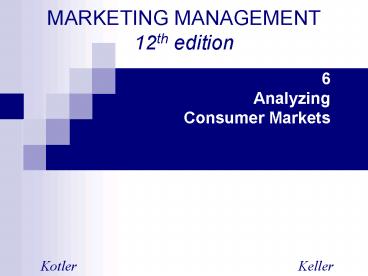MARKETING MANAGEMENT 12th edition - PowerPoint PPT Presentation
1 / 22
Title:
MARKETING MANAGEMENT 12th edition
Description:
How do consumer characteristics influence buying behavior? ... Lexicographic. Elimination-by-aspects. 6-20. Perceived Risk. Functional. Physical. Financial ... – PowerPoint PPT presentation
Number of Views:62
Avg rating:3.0/5.0
Title: MARKETING MANAGEMENT 12th edition
1
MARKETING MANAGEMENT12th edition
- 6
- Analyzing
- Consumer Markets
Kotler Keller
2
Chapter Questions
- How do consumer characteristics influence buying
behavior? - What major psychological processes influence
consumer responses to the marketing program? - How do consumers make purchasing decisions?
- How do marketers analyze consumer decision making?
3
What Influences Consumer Behavior?
- Cultural factors
- Social factors
- Personal factors
4
Culture
The fundamental determinant of a persons wants
and behaviors acquired through
socialization processes with family and other key
institutions.
5
Subcultures
- Nationalities
- Religions
- Racial groups
- Geographic regions
- Special interests
6
Fast Facts About American Culture
- The average American
- chews 300 sticks of gum a year
- goes to the movies 9 times a year
- takes 4 trips per year
- attends a sporting event 7 times each year
7
Social Classes
Upper uppers Lower uppers Upper middles Middle
class Working class Upper lowers Lower lowers
8
Characteristics of Social Classes
- Within a class, people tend to behave alike.
- Social class conveys perceptions of inferior or
superior position. - Class may be indicated by a cluster of variables
(occupation, income, wealth). - Class designation is mobile over time.
9
Social Factors
Reference groups
Family
Social roles
Statuses
10
Reference Groups
- Membership
- Primary
- Secondary
- Aspirational
- Dissociative
11
Family
- Family of Orientation
- Religion
- Politics
- Economics
- Family of Procreation
- Everyday buying behavior
12
Personal Factors
- Age
- Life cycle stage
- Occupation
- Wealth
- Personality
- Values
- Lifestyle
- Self-concept
13
Brand Personality
- Sincerity
- Excitement
- Competence
- Sophistication
- Ruggedness
14
Key Psychological Processes
- Motivation
- Perception
- Learning
- Memory
15
Motivation
- Freuds theory
- Maslows hierarchy of needs
- Herzbergs two-factor theory
16
Perception
- Selective attention
- Selective retention
- Selective distortion
- Subliminal perception
17
Figure 6.4 Consumer Buying Process
- Problem recognition
- Information search
- Evaluation
- Purchase decision
- Postpurchase behavior
18
Sources of Information
- Personal
- Commercial
- Public
- Experiential
19
Non-compensatory Models of Choice
- Conjunctive
- Lexicographic
- Elimination-by-aspects
20
Perceived Risk
- Functional
- Physical
- Financial
- Social
- Psychological
- Time
21
Other Theories of Consumer Decision Making
- Involvement
- Elaboration Likelihood Model
- Low-involvement marketing strategies
- Variety-seeking buying behavior
- Decision Heuristics
- Availability
- Representativeness
- Anchoring and adjustment
22
Mental Accounting
- Consumers tend to
- Segregate gains
- Integrate losses
- Integrate smaller losses with larger gains
- Segregate small gains from large losses































